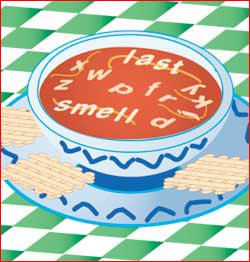Alphabet Soup
 Nurses love alphabet soup.
Nurses love alphabet soup. 
Maybe it’s a sign of aging, but I don’t know what most of those letters behind a nurse’s name mean anymore. Yes, I know they indicate what academic and certification credentials someone has earned, but there are so many new ones now, I'm getting confused.
I know I’m going to stir up a hornet's nest by bringing this subject up. Nurses are passionate about our profession's alphabet soup. To those nurses who have worked hard to earn degrees and professional credentials, I say well done, take a bow. You’ve earned it. However, I'm not the only nurse who is confused by the alphabet soup, and if nurses are confused, how can we expect the public to understand what all those letters mean.
Sometimes, I think nurses get a little crazy about collecting letters behind their name. There are six basic types of credentials nurses may possess and use after their names.
Degree: These credentials are based on the completion of an educational program. Examples: BSN, MSN, PhD, EdD, JD.
Licensure: These credentials are based on the successful passing of a national licensure exam. Examples: RN, LPN
State designation or requirement: These credentials are similar to licensure, but go beyond the basics, designating authority and recognition to practice at a more advanced level in a state. Examples: APN, APRN, NP
(OK, so far I understand what's going on, but now it starts getting murky.)
National certifications: These credentials are awarded by a nationally recognized certifying body, such as the American Nurses Association’s Credentialing Center, and the American Academy of Nurse Practitioners' Certifying Board. Over the years, they have developed all kinds of “add on” letters including RN-C, RN-BC, and NP-C. These organizations have invented so many different credentials, few people know what they mean anymore. One reason for this explosion in credentialing could revolve round the revenue it generates for these organizations. You know they don’t give these credentials away. Nurses buy study guides, pay to take the tests, and must keep their credentials up-to-date by acquiring CEUs. Oh yes, developing CEUs also generate income for those organizations. Interesting isn't it.
Awards of honors: Two examples of awards of honors are FAAN (Fellow of the American Academy of Nursing), and FCCM (Fellow of Critical Care Medicine). Those credentials are for members only, and are awarded for outstanding service or accomplishments. I doubt that many people outside of our profession know what those awards are, or what they mean.
Other certifications: Like nursing, other fields have alphabet soup. Some nurses venture outside of the nursing profession to glean additional letters behind their name.
I've met nurses who wear credentials like kids wear designer jeans. It's all about the label. When I graduated from nursing school a bizillion years ago, you got an RN, period! Please, stop the insanity and lay off the alphabet soup.
Things are getting too complicated for old nurses like me.













4 Comments:
well i have been in nursing for 10 years and that may not be quite the seasoned nurse, but i don't get the credentials either!?? there is a nurse i work with that says RN, POCN, BSN, research nurse on her card. HELLO! take that down a notch. i don't even know what is going on, i am sure her patients don't.
POCN......well, that's one I've never heard of before. What is it?
In my life away from the computer, I not only work as a psych nurse and a freelance writer, I lobby on Capitol Hill. I call myself a "legislative nurse educator". Most lawmakers come to Washington without a background in health care, so I make it my business to go to Capitol Hill to teach them what they should know before passing laws that affect our patients and our profession. No, I don’t get paid, it’s my hobby. Anyway, it’s been my experience that legislators don’t care about a nurse’s credentials past the letters “RN.”
One time I had a nursing colleague insist that I MUST have some credentials because I’m a very knowledgeable and successful nurse. I’m also a bit of a smartass, so one day, I made up business cards reading, “My Name,” RN, HU, MA, N. She said, “See, I knew you were holding out on me.” She didn’t get it. Combine the letters. I told you I’m a smartass.
Mother Jones RN
HU,MA,N - I just did a spit take on my brand new MacBookPro. First one since I got it.
I thought I was spit-take proof, but you have proven me otherwise.
Part of me wants to take the CEN exam because I like those particular pretty letters after my name. What I don't like is the pretty penny it costs to take the darn test that doesn't lead to a single bit of increased pay.
It increases my ego, that's about it.
Now, ask me if I'll put BSN after my name in 2027 when I actually finish the degree. Um...you know, I really wanna say no, but my ego is such that I may just do it. Then again, I use ADN after my name now.
But the patients don't care one iota, although they did ask about the CEN when I had it.
This comment has been removed by a blog administrator.
Post a Comment
<< Home